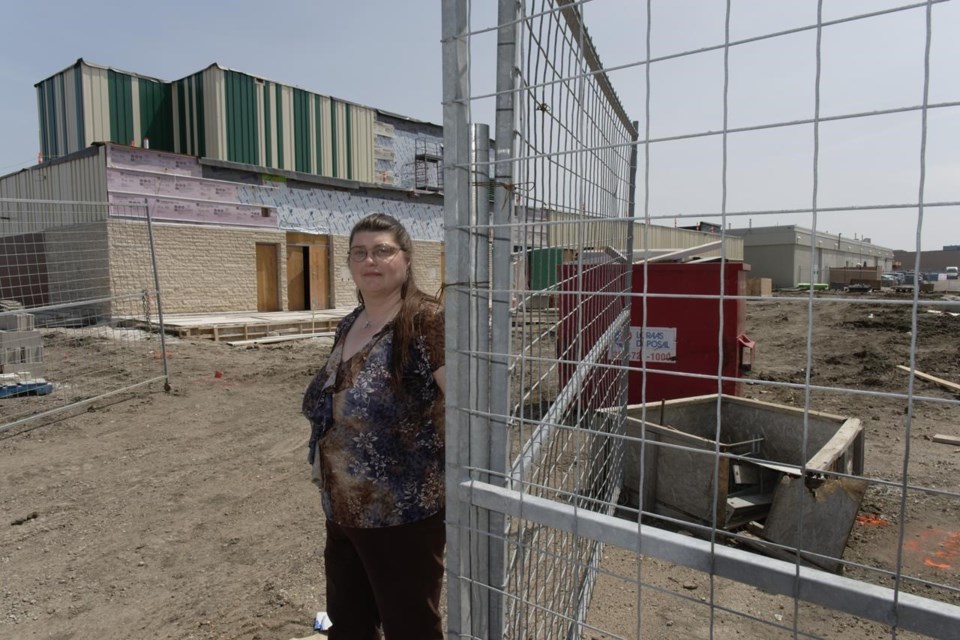REGINA — Inside a new health centre in Saskatchewan's capital will be a space solely for people urgently requiring psychological help.
And, from the outside, it can be accessed through a dedicated door.
It's what mental health advocate Rebecca Rackow has long been hoping for.
"I'm ecstatic they are actually implementing that," said Rackow, the research and advocacy director at the Canadian Mental Health Association's Saskatchewan branch, located in Regina.
"We explored what that might look like, but we never knew if it was going to happen."
Citing her research, Rackow said the facility in Regina could be the first in Canada to have a dedicated entrance for mental health patients.
She said there is one facility in Australia that has a separate entrance, and it works well.
Since March 2022, Saskatchewan has been constructing a new urgent care centre in Regina that's anticipated to open early next year. It's to operate 24 hours a day, seven days a week with a team of health-care employees helping those with physical and mental ailments.
Colleen Quinlan, the Saskatchewan Health Authority's director of mental health and addictions, said in June that the centre will have two separate waiting rooms — one for those with mental health needs and the other for physical needs.
It will also have two entrances: a main one facing east and a side entry that leads to the mental health space. People will be able to enter through whichever door they choose and staff are to triage them accordingly.
Quinlan said the health authority decided to have a separate mental health space because those experiencing a crisis often are overwhelmed in hospital emergency rooms.
"We hope the urgent care centre is a different kind of environment. Not so busy, you know, lights buzzing and bells going off in the same way as an emergency department," Quinlan said.
Rackow said research shows a hectic emergency room can lead to agitation, frustration and sometimes violence, resulting in patients leaving the hospital.
These situations are particularly acute at night, when services are limited but especially needed, she said.
"There's not a lot of stuff open, there's not a lot of people around and you're left alone with your thoughts, and I think that's when a lot of people's thoughts snowball into a crisis situation," she said.
"So having that urgent care centre open 24-7 is a big deal for us."
The government plans to build a similar centre in Saskatoon, but Quinlan declined to say if it will have a separate mental health entrance.
Rackow said she and her colleagues began researching best practices for emergency mental-health care after the death of Samwel Uko in Regina. He drowned more than three years ago in the city's Wascana Park after he sought mental health help at the hospital.
During his second visit to the hospital, security escorted him out of the emergency room before he could get treatment. He then went into a lake and didn't come up for air.
An inquest into Uko's death recommended the Saskatchewan Health Authority implement mental health and cultural diversity training, as well as ensure a psychiatric nurse be available at all hours.
The health authority, which paid Uko's family $81,000 for failing to provide care, has said the team of staff at the new urgent care centre are to have proper training.
Quinlan also said the centre is to have psych nurses or staff trained in social work to help mental health patients immediately.
"We did learn a lot from that situation. It was very sad," she said of Uko's death, adding the training program is being finalized.
"We will need to be able to work together on this."
Rackow said more is needed to ensure mental health help is the best it can be.
She said the Police and Crisis Team in Regina needs to be operating at all hours a week. The team is made up of plainclothes police officers and social workers who respond to those in a mental health crisis.
She also said staff need to assess mental health patients more quickly when they show up at the front desk. Staff should also ensure patients are connected to community supports when they leave.
"I think everybody is trying to help the most they can. It's just the system needs to be reworked so that the help everybody's giving is more efficiently effective," Rackow said.
Quinlan said she hopes the new space offers a "really great experience" for those requiring mental health services.
"And that we are able to give them good care in a centre and connect them to ensure they get excellent followup in the community to help keep them healthy," she said.
This report by The Canadian Press was first published Aug. 7, 2023.
Jeremy Simes, The Canadian Press



